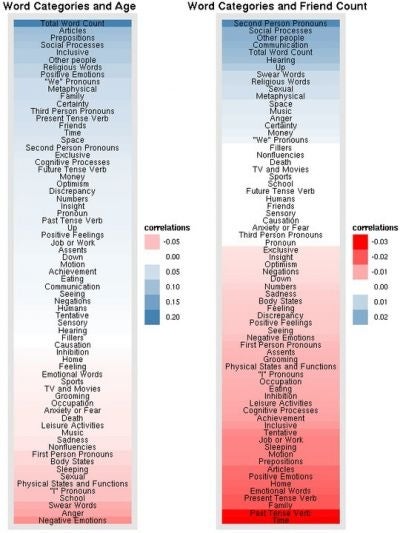Facebook has analyzed around one million updates posted by English speakers in the US to determine the most common patterns found on the social networking site.
"Words [found within the Facebook status updates] are categorized based on their part of speech (pronouns, articles, past-tense verbs, etc.), their emotional content (positive emotions, negative emotions, sadness, anger, etc.), or the topic they are related to (school, work, religion, etc)" explained Facebook's Data Team in a December 24 blog post about the study.
Facebook's data revealed that younger users were more likely to express negative emotions like anger and had a higher rate of using profanities than their older counterparts.
Younger users were also more self centered, were found to use more self referring pronouns (like "I" and "my") and frequently wrote about their school life.
Older Facebook users typically wrote longer status updates. Their posts often referenced others (family members and friends) and included a higher rate of prepositions and articles.
Facebook status update patterns also differed between those with higher and lower numbers of Facebook friends.
"Popular" Facebook users "tend to use more of the pronoun "you" and other second person pronouns. They write longer updates, and use more words referring to music and sports," noted the social networking site.
"More "popular" people also talk less about their families, are less emotional overall, use fewer past tense and present tense verbs and words related to time."
Posts about work or school were more frequent seen in the morning while words that were linked to leisure increased as the day progressed.
Interestingly, emotional word groups also fluctuated throughout the day. Positive emotional word use was much higher in the mornings (a time when negative emotional word use is low). As the day progresses, positivity decreases and negative word use increases.
For more information about the study and to understand why positive emotional status updates receive fewer comments than negative emotional updates visit Facebook's "What's on your mind?" blog post.
http://www.facebook.com/notes/facebook-data-team/whats-on-your-mind/477517358858
Subscribe to Independent Premium to bookmark this article
Want to bookmark your favourite articles and stories to read or reference later? Start your Independent Premium subscription today.


Join our commenting forum
Join thought-provoking conversations, follow other Independent readers and see their replies